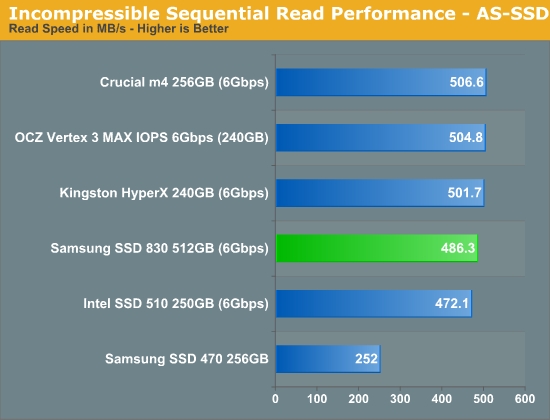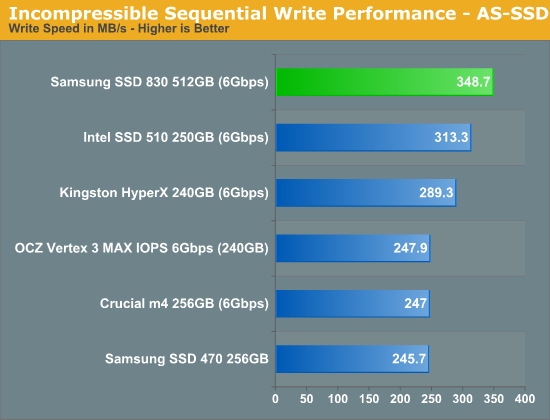The Samsung SSD 830 Review
by Anand Lal Shimpi on September 24, 2011 1:02 AM EST- Posted in
- SSDs
- Storage
- Samsung
- pm830
- Samsung SSD 830
AS-SSD Incompressible Sequential Performance
The AS-SSD sequential benchmark uses incompressible data for all of its transfers. The result is a pretty big reduction in sequential write speed on SandForce based controllers.


Although we saw the 830 take a backseat to the SandForce based offerings in our compressible sequential write test, the roles are reversed in our incompressible write test. Most huge sequential writes are going to be incompressible in nature (e.g. moving a H.264 movie around) so these numbers are quite relevant.










99 Comments
View All Comments
iq100 - Sunday, September 25, 2011 - link
Great review, great quality video and sound, BUT please try and speak much slower.If one knows the material ahead of time, your pace is fine, BUT please remember that your audience is supposed to be those who do NOT know the material. 'Pause' is a sound! Practice making a 'pause' sound between syllables. Your articulation is good, but you leave out the intra syllable pause sound!
Ramon Zarat - Sunday, September 25, 2011 - link
Nice article, but It would be **very** useful to state firmware version of each SSD tested.For instance, the latest 0009 firmware for the M4 series provide an astonishing speed boost of around 20% depending on the condition. It's been available since Agust 25, so I assume the current test was done with M4 firmware version 0009, right?
Information of that significance, we absolutely need to know before drawing any conclusions.
Fun Guy - Monday, September 26, 2011 - link
Agreed, that is a HUGE oversight, lending the credibility of the reviews as suspect. If they can't even collect firmware information, what else are they missing? I've read at least two mistakes made and corrected already in this review, with no mention of the updates in the beginning of the thread. Very sloppy.anandtech pirate - Monday, September 26, 2011 - link
hey, why doesn't my login & password work in the forums? & when i go to create another account with my username, anandtechpirate, it says its already taken.tommythorn - Monday, September 26, 2011 - link
While I generally find Anandtech's SSD reviews to be amongst the best out there, Iwish you would give less value to compression/dedup as any who uses drive encryption
(transparently available on Mac OS X Lion for example) will not benefit at all. Notably,
this _also_ applies to 4 KB random reads/writes, not just streaming workloads.
thornburg - Monday, September 26, 2011 - link
Thanks for the review, Anand.Can you tell us whether this drive supports TRIM in OS X?
I've heard that the Apple-supplied SSDs finally do support TRIM in the newer versions of the OS. I wondered if maybe this drive (and/or the 470) are supported, since Apple sometimes uses Samsung SSDs.
Thanks.
NCM - Monday, September 26, 2011 - link
You can enable TRIM for non-Apple supplied SSDs in Mac OS X using the free TRIM Enabler, see <http://www.groths.org/?page_id=322>.Loremonger - Monday, September 26, 2011 - link
I like the video review and "putting a face" on the article. It would be nice in the future to show hands-on footage of the item being reviewed, as well as benchmarking setups and results. I think it would be quite interesting for your readers to see the testing process (heavily edited, of course; I know this stuff takes a long time).As usual, thank you for a thorough and insightful review.
mino - Monday, September 26, 2011 - link
476GiB * 1.0737 (GiB->GB) == 512.0 GBThe published TABLE thus DECLARES NO SPARE SPACE present !
I am sure that is not the case, so the table obviously needs fixing ...
Shazbud - Tuesday, September 27, 2011 - link
I am seeing what appears to be a serious inconsistency in the article:The article states (early on): "Samsung SSDs were among the first I reviewed and while they weren't anywhere near the fastest back then, every last one of those drives is still working without issue in my lab today."
In closing the comment "From a drive that I simply wouldn't recommend...." then really confuses me - why would you not recommend this drive? Speed seems to have been the only downside, but that appears to have been traded off for reliability.